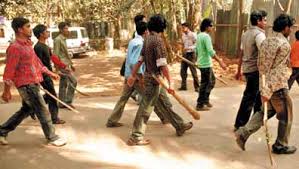India's Dream, Bangladesh's Disaster
By John Vidal
Indian plans to divert vast quantities of water from major rivers, including the Ganges and Brahmaputra, threaten the livelihoods of more than 100 million people downstream in Bangladesh, the Bangladeshi government fears. Ministers are so concerned that they are considering appealing to the United Nations to redraft international law on water sharing.
The ambitious Indian plans to link major rivers flowing from the Himalayas and divert them south to drought-prone areas are still on the drawing board, but Bangladeshi government scientists estimated that even a 10% to 20% reduction in the water flow to the country could dry out great areas for much of the year.
More than 80% of Bangladesh's 20 million small farmers grow rice and depend on water that has flowed through India.
"The idea of linking these rivers is very dangerous.It could affect the whole of Bangladesh and be disastrous," said Hafiz Ahmad, the water resources minister. "The north of Bangladesh is already drying out after the Ganges was dammed by India in 1976. Now India is planning to do the same on [many of] the 53 other rivers that enter the country via India. Bangladesh depends completely on water."
The minister said the government had protested to India but had so far not had any response. "Without this water we cannot survive," he said. "If [rice] production falls then we would not know how to survive. We want no kind of war, but international law on sharing water is unsure and we would request the UN to frame a new law. It would be a last resort."
The Indian government is preparing to seek international funds for its giant river-linking project, intended to divert water from the north of the country to drought-prone southern and eastern states. Up to one third of the flow of the Brahmaputra and other rivers could be diverted to southern Indian rivers to provide 173bn cubic metres of water a year, supplying millions of people in Uttar Pradesh and Karnataka states with more reliable drinking and irrigation water.
But the plan - which could cost between £44bn and £125bn and take at least 14 years to implement, making it potentially the largest and most expensive water project in the world - would redraw the subcontinent's hydrological map with immense ecological and social consequences.
It involves building hundreds of reservoirs and digging more than 600 miles of canals. Preliminary estimates by environment groups suggest that more than 3,000 square miles of land could be flooded and 3 million people forced off their land.
India's national water development agency, which is backing the scheme, has said it will divert enough water to irrigate 135,000 square miles of farmland and produce 34,000 megawatts of hydroelectricity. However, much of the electricity would be needed to pump the water around.
"This could trigger a long-term disaster on the subcontinent and trigger bloodshed in the region," said Shashanka Saadi, of Action Aid Bangladesh.
Bangladesh already knows the consequences of India restricting its water. The Farakka barrage, built across the Ganges 11 miles from the Bangladeshi border in 1974, had at certain times of the year reduced by half the water that once flowed via the Ganges into Bangladesh, said Mr Ahmad.
"Great parts are turning into a desert, rivers have lost their navigability, salt water is intruding into farming areas. You can walk across the river Gori at some times of the year," said the minister.
Although the Indian and Bangladeshi governments have a water sharing agreement for the Ganges, there are none for the other 53 rivers that cross the border. Bangladeshi water engineers say that Indian barrages, canals, reservoirs and irrigation schemes are slowly strangling the country and are stopping its development.
Bangladesh, which is too flat for major reservoirs, says if India goes ahead with its schemes, it may have to build a network of expensive canals to irrigate large areas now fed naturally by the Brahmaputra.
"It would cost a huge amount of money, but we may need it to survive," said Mukhles uz Zaman, the director general of the Bangladesh water development board. "At the moment there is just about enough water for everyone, but the Indian plans could be disastrous. They would have catastrophic effects on Bangladesh's rice fields."
One of the most serious consequences of India's continuing search for irrigation water is expected to be the further drying out of the Sunderbans, the world's largest coastal forest, a world heritage site shared by India and Bangladesh and vital for fish. "The forest needs fresh water to survive. Because of the Farakka dam fresh water is not reaching there and the rivers are silting up rapidly. The trees are dying" said Mr Zaman.
Local people say the Farakka barrage has already changed millions of people's lives. "In eight to 10 years I believe that most of the Sunderbans will be silted up. The rivers flow far less than before the barrage was built, and it is getting worse every year," says Humayun Kabir, of Noapara, where a large river is now a small backwater and 6 metres (20ft) of silt has been deposited across thousands of hectares.
"These new Indian plans would finish the whole area."


